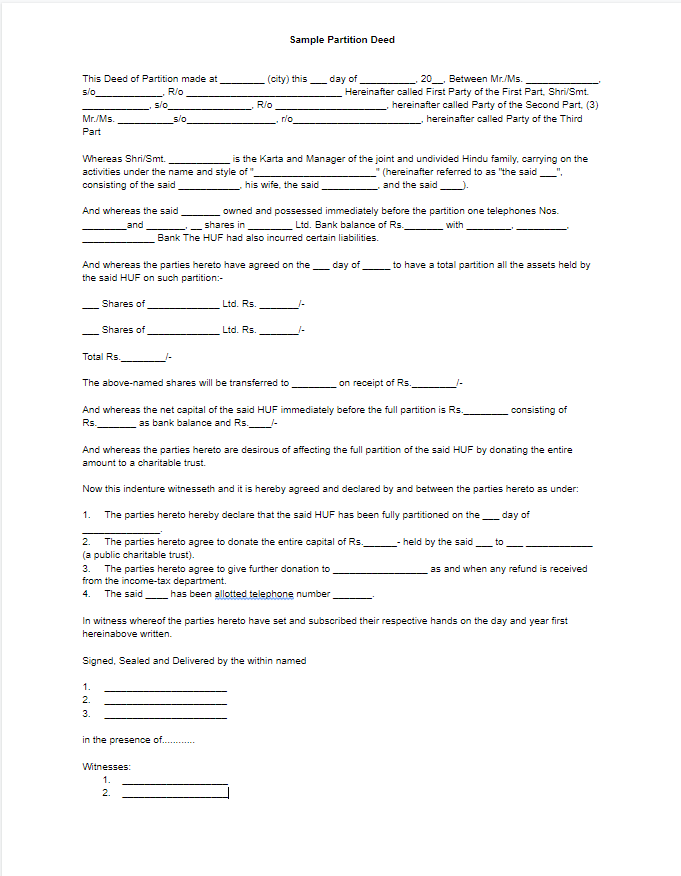Table of Contents
Quality Service Guarantee Or Painting Free

Get a rental agreement with doorstep delivery

Find the BEST deals and get unbelievable DISCOUNTS directly from builders!

5-Star rated painters, premium paints and services at the BEST PRICES!
Loved what you read? Share it with others!


Submit the Form to Unlock the Best Deals Today
Check Your Eligibility Instantly

Experience The NoBrokerHood Difference!
Set up a demo for the entire community

Tenant Super Relax Plan
Enjoy Hassle-Free Renting
 Full RM + FRM support
Full RM + FRM support Instant alerts & premium filters
Instant alerts & premium filters Rent negotiation & relocation help
Rent negotiation & relocation helpWhat is Partition Deed and Why It is Important?
Table of Contents
A partition deed is a vital document in India for dividing jointly-owned properties, often within families, ensuring a fair distribution of assets and responsibilities among co-owners. It prevents disputes and provides legal clarity, following the Indian Registration Act of 1908. Defining each co-owner's share, minimizes potential conflicts, promoting harmony within joint property arrangements. Understanding this document is crucial for navigating property division in India. In this article, we explore the significance and key elements of a partition deed in the Indian context.
What is a Partition Deed?

A partition deed is a legal document that divides jointly-owned property among shareholders, allowing them to own and manage their portions independently. This is especially common in joint households when family members want to claim their inherited shares. Each divided part gains individual title, enabling owners to sell, gift, or transfer their property as desired. It simplifies property management and ownership within joint families.
Partition with Mutual Consent Vs. Without Mutual Consent

Consent of Both Parties
- If all co-owners acknowledge that the property owner should be split, the partition deed can be signed.
- The partition deed guarantees that the property is divided according to each individual's portion.
- Co-owners become lawful owners of their portion of the property when the partition deed is executed, and they are able to give, sell, or trade their share of the property.
In the Absence of Mutual Consent
- If the co-owners refuse to sign a partition deed, a lawsuit must be brought to court.
- Following that, the partition deed must be executed and recorded on stamp paper with the details of each joint owner's portion.
Recommended Reading

Partition Suit in India: Latest Judgement, Process, Legal Rights & Court Procedure
May 28, 2025
56029+ views

What is Partition Deed and Why It is Important?
October 11, 2021
7639+ views
What Does the Partition Act Entail?

A partition action must be filed if the family agrees to proceed with the partition deed. If there are any disagreements about the property's rights, you can file a partition suit to have the disagreement resolved by a court. A division deed must be signed if all parties concerned are willing to settle any problems peacefully.
Quality Service Guarantee Or Painting Free

Get a rental agreement with doorstep delivery

Find the BEST deals and get unbelievable DISCOUNTS directly from builders!

5-Star rated painters, premium paints and services at the BEST PRICES!
The portion of every co-owner of the property is defined by a partition document. Only when the division deed has been properly registered with the Sub-Registrar office can it be deemed a valid document. Following registration, the next step is to thoroughly register and imprint it on stamp paper.
Huf/Hindu Undivided Family Partition Deed Format in Word
Below mentioned partition deed will give you a general idea about the format commonly used in the English language:
This deed of partition made at __________this _________ day of
(1) Mr._________________, S/o._____________, Age ______years, Occupation__________, Residing at__________________________. Hereinafter referred to as the first party.
(2) Mr_________________, S/o._____________, Age ______years, Occupation__________, Residing at__________________________. Hereinafter referred to as the second party.
(3) Miss_________________, D/o._____________, Age ______years, Occupation__________, Residing at__________________________. Hereinafter referred to as the third party.
WHEREAS;
- The parties are the members and coparceners of their joint and undivided Hindu Family and a house property situated at ________________, the details of which are given in Schedule ‘A’. Each party hereto is entitled to a share in the said property.
- The parties desire to implement a partition of the said properties amongst themselves as they no longer desire to continue as members and coparceners of their joint family property.
- The parties have agreed that the said property will be divided in such a way that:
(a) The property described in the first schedule shall be allotted to the first party exclusively.
(b) The property described in the second schedule shall be allotted to the second party exclusively.
(c) The property described in the said third schedule shall be allotted to the third party exclusively.
- The parties hereto have proposed to effect and record the said partition in the manner following:
Now this deed witnesseth that
- Each party hereto grant and release all his/her undivided share, right, title and interest in the property allotted to the other so as to constitute each party the sole and absolute owner of the property allotted to him/her.
- Each party agrees that they will get the deed executed and registered and will equally share expenses involved in the process.
- Each party agrees that they will not cause any hindrances or claim and right on the share they have agreed to give up through this partition deed.
Schedule A
(Details of Undivided properties belong to Joint Family)
Sl.
No.
Description of the property
1
2
3
4
FIRST SCHEDULE
(Property allotted to the share of Sri.__________________________First party)
SECOND SCHEDULE
(Property allotted to the share of Sri.__________________________Second party)
THIRD SCHEDULE
(Property allotted to the share of Miss_________________________Third party)
WITNESS:
- FIRST PARTY
- SECOND PARTY
- THIRD PARTY
Partition Deed Between Two Brothers Format
When a property is co-owned by two brothers, a partition deed between two brothers is executed in the presence of mention of all assets and liabilities along with the witness details.

Property Partition Deed Format in Marathi
खाली विभाजन कराराचे सामान्य स्वरूप दिले आहे. येथे नोंद घ्या की ही कृती केवळ वाचकांना कराराचा सामान्य दृष्टीकोन देण्यासाठी आहे. विभाजनाची ही कृती (१) श्री. _____________, एस / ओ. _________, वय ______ वर्षे, व्यवसाय ______, ______________________ येथे राहणा-या _________ दिवशी झाली. यानंतर पहिला पक्ष म्हणून संदर्भित (२) श्री. _____________, एस. ओ. _________, वय ______ वर्ष, व्यवसाय ______, ______________________ येथे रहा. यानंतर दुसरा पक्ष म्हणून उल्लेख केला जातो. ()) मिस _____________, डी / ओ. _________, वय ______ वर्ष, व्यवसाय ______, ______________________ येथे रहा. यानंतर तृतीय पक्ष म्हणून संदर्भित जेथे;
- पक्ष हे त्यांच्या संयुक्त आणि अविभाजित हिंदू कुटुंबाचे सदस्य आणि सहकारी आहेत आणि ________________ वर स्थित घर मालमत्ता आहेत, ज्याचा तपशील अनुसूची 'ए' मध्ये देण्यात आला आहे. आतापर्यंत प्रत्येक पक्ष या मालमत्तेत वाटा घेण्यास पात्र आहे.
- या मालमत्तेचे विभाजन आपापसात अंमलात आणण्याची पक्षांची इच्छा आहे कारण त्यांना यापुढे सदस्य आणि सहकारी म्हणून पुढे जाण्याची इच्छा नाही. त्यांची संयुक्त कुटुंब मालमत्ता.
- पक्षांनी सहमती दर्शविली आहे की उक्त मालमत्ता अशा प्रकारे विभागली जाईलः
(अ) पहिल्या वेळापत्रकात वर्णन केलेली मालमत्ता पहिल्या पक्षास विशेषतः दिली जाईल. (ब) दुसर्या वेळापत्रकात वर्णन केलेली मालमत्ता दुसर्या पक्षाला पूर्णपणे दिली जाईल. (क) वरील तृतीय वेळापत्रकात वर्णन केलेली मालमत्ता तृतीय पक्षाला पूर्णपणे दिली जाईल.
- आतापर्यंत पक्षांनी खाली दिलेल्या पद्धतीने प्रभाग रेकॉर्ड करण्याचा प्रस्ताव दिला आहेः
आता हे कृत्य याची साक्ष देत आहे
- प्रत्येक पक्ष त्याला वाटेल त्या मालमत्तेत आपला सर्व / तिचा अविभाज्य हिस्सा, हक्क, हक्क आणि व्याज देईल आणि त्यास सोडेल जेणेकरून प्रत्येक पक्ष त्याला / तिला देण्यात आलेल्या मालमत्तेचा एकमात्र आणि परिपूर्ण मालक बनवू शकेल.
- प्रत्येक पक्ष सहमत आहे की त्यांना कृतीची अंमलबजावणी आणि नोंदणी होईल आणि प्रक्रियेत गुंतलेला खर्च तितकाच सामायिक करेल.
- प्रत्येक पक्ष सहमत आहे की या विभाजन कार्यातून देण्याचे त्यांनी मान्य केले त्या वाटेवर ते कोणतेही अडथळे आणणार नाहीत किंवा दावा करु शकणार नाहीत.
अनुसूची अ (अविभाजित मालमत्तेचा तपशील संयुक्त कुटूंबातील आहे) अनु. प्रथम मालमत्तेचे तपशील 1 2 3 4 प्रथम शैक्षणिक (श्री. ______________________ प्रथम पक्षाच्या वाट्याला दिलेली मालमत्ता) दुसर्या शाळेतील (मालमत्तेच्या वाट्याला दिलेली जागा श्री.
- पहिला पक्ष
- दुसरे पक्ष
- तृतीय पक्ष
Property Partition Deed Format in Hindi
नीचे दिए गए विभाजन विलेख के लिए एक सामान्य प्रारूप है। यहाँ ध्यान देंइस विलेख में केवल पाठकों को विलेख का एक सामान्य दृष्टिकोण देना है।
विभाजन का यह कार्य __________this _________ के दिन किया गया
(१) श्री। _________________, एस / ओ। _____________, आयु ______ वर्ष, व्यवसाय __________, __________________________ पर रहते हैं। इसके बाद पहली पार्टी के रूप में जाना जाता है।
(२) Mr_________________, S / o। _____________, आयु ______ वर्ष, व्यवसाय __________, __________________________ पर रहते हैं। इसके बाद संदर्भ देंदूसरी पार्टी के रूप में एड।
(३) _________________________, D / o। _____________, आयु ______ वर्ष, व्यवसाय __________, __________________________ पर रहते हैं। इसके बाद तीसरे पक्ष के रूप में जाना जाता है।
जहाँ तक;
पार्टियां अपने संयुक्त और अविभाजित हिंदू परिवार के सदस्य और कॉपरेकर और ________________ पर स्थित एक घर की संपत्ति हैं, जिनका विवरण अनुसूची ‘ए’ में दिया गया है। प्रत्येक पार्टी हेटो उक्त संपत्ति में हिस्सेदारी का हकदार है।
पार्टियां अपने बीच उक्त संपत्तियों के विभाजन को लागू करने की इच्छा रखती हैं, क्योंकि वे अब अपने संयुक्त परिवार की संपत्ति के सदस्यों और कॉपर्कर के रूप में जारी रखने की इच्छा नहीं रखती हैं।
पार्टियों ने सहमति व्यक्त की है कि उक्त संपत्ति को इस तरह से विभाजित किया जाएगा:
(ए) पहली अनुसूची में वर्णित संपत्ति विशेष रूप से पहली पार्टी को आवंटित की जाएगी।
(बी) दूसरी अनुसूची में वर्णित संपत्ति को आवंटित किया जाएगाecond पार्टी विशेष रूप से।
(ग) उक्त तीसरी अनुसूची में वर्णित संपत्ति विशेष रूप से तीसरे पक्ष को आवंटित की जाएगी।
पार्टियों के सदस्यों ने कथित विभाजन को निम्नलिखित तरीके से प्रभावित करने और रिकॉर्ड करने का प्रस्ताव दिया है:
अब यह विलेख गवाह है कि
प्रत्येक पक्ष को हर कोई अपने सभी अविभाजित हिस्से को देने के लिए एक दूसरे को आवंटित संपत्ति में अपना सभी अविभाजित हिस्सा, सही, शीर्षक और ब्याज जारी करता है।उसे / उसे आवंटित की गई संपत्ति का ner।
प्रत्येक पक्ष इस बात से सहमत है कि वे विलेख निष्पादित और पंजीकृत होंगे और प्रक्रिया में शामिल खर्चों को समान रूप से साझा करेंगे।
प्रत्येक पार्टी इस बात से सहमत है कि वे इस विभाजन विलेख के माध्यम से देने के लिए सहमत हुए हिस्से पर कोई बाधा या दावा और अधिकार नहीं देंगे।
आयोजित करें
(अविभाजित संपत्तियों का विवरण संयुक्त परिवार से है)
क्र।
नहीं।
डेसंपत्ति का परिग्रहण
1
2
3
4
पहली अनुसूची
(श्री .__________________________ प्रथम पक्ष के हिस्से को आवंटित संपत्ति)
सेकंड स्कंध
(संपत्ति। श्री .__________________________ की पार्टी को आवंटित संपत्ति)
तृतीय अनुसूची
(संपत्ति Miss_________________________Third पार्टी के हिस्से को आवंटित)
गवाह:
FIRST PARTY
सेकंड पार्टी
और #13;
THIRD PARTY
Property Partition Deed Format in Telugu
Here is a partition deed sample in Telugu
విభజన దస్తావేజు కోసం సాధారణ ఫార్మాట్ క్రింద ఇవ్వబడింది. ఈ దస్తావేజు పాఠకులకు దస్తావేజు యొక్క సాధారణ దృక్పథాన్ని ఇవ్వడానికి మాత్రమే అని ఇక్కడ గమనించండి. విభజన యొక్క ఈ దస్తావేజు __________ ఈ _________ రోజు (1) మిస్టర్ ._________________, S / o ._____________, వయస్సు ______ సంవత్సరాలు, వృత్తి __________, వద్ద నివసిస్తున్నారు __________________________. ఇకపై మొదటి పార్టీగా సూచిస్తారు. (2) Mr_________________, S / o ._____________, వయస్సు ______ సంవత్సరాలు, వృత్తి __________, __________________________ వద్ద నివసిస్తున్నారు. ఇకపై రెండవ పార్టీగా సూచిస్తారు. (3) మిస్ _________________, డి / ఓ ._____________, వయసు ______ సంవత్సరాలు, వృత్తి __________, వద్ద నివసిస్తున్నారు __________________________. ఇకపై మూడవ పార్టీగా సూచిస్తారు. WHEREAS;
- పార్టీలు వారి ఉమ్మడి మరియు అవిభక్త హిందూ కుటుంబ సభ్యులు మరియు ________________ వద్ద ఉన్న ఇంటి ఆస్తి, వీటి వివరాలు షెడ్యూల్ 'ఎ' లో ఇవ్వబడ్డాయి. ప్రతి పార్టీ ఇక్కడ చెప్పిన ఆస్తిలో వాటా పొందటానికి అర్హులు.
- పార్టీలు తమలో తాము పేర్కొన్న లక్షణాల విభజనను తమలో తాము అమలు చేసుకోవాలని కోరుకుంటాయి, వారి ఉమ్మడి కుటుంబ ఆస్తి.
- చెప్పిన ఆస్తిని ఈ విధంగా విభజించమని పార్టీలు అంగీకరించాయి:
(ఎ) మొదటి షెడ్యూల్లో వివరించిన ఆస్తి మొదటి పార్టీకి ప్రత్యేకంగా కేటాయించబడుతుంది. (బి) రెండవ షెడ్యూల్లో వివరించిన ఆస్తి రెండవ పార్టీకి ప్రత్యేకంగా కేటాయించబడుతుంది. (సి) చెప్పిన మూడవ షెడ్యూల్లో వివరించిన ఆస్తి మూడవ పార్టీకి ప్రత్యేకంగా కేటాయించబడుతుంది.
- ఈ విభజనను క్రింది పద్ధతిలో అమలు చేయడానికి మరియు రికార్డ్ చేయడానికి పార్టీలు ఇక్కడ ప్రతిపాదించాయి:
ఇప్పుడు ఈ దస్తావేజు దానికి సాక్ష్యమిచ్చింది
- ప్రతి పార్టీ అతనికి / ఆమెకు కేటాయించిన ఆస్తి యొక్క ఏకైక మరియు సంపూర్ణ యజమానిగా ఉండటానికి, ప్రతి పార్టీ తన / ఆమెకు అవిభక్త వాటా, హక్కు, శీర్షిక మరియు మరొకరికి కేటాయించిన ఆస్తిపై ఆసక్తిని మంజూరు చేస్తుంది మరియు విడుదల చేస్తుంది.
- ప్రతి పార్టీ వారు దస్తావేజును అమలు చేసి నమోదు చేస్తారని అంగీకరిస్తారు మరియు ఈ ప్రక్రియలో పాల్గొనే ఖర్చులను సమానంగా పంచుకుంటారు.
- ప్రతి పార్టీ వారు ఈ విభజన దస్తావేజు ద్వారా వదులుకోవడానికి అంగీకరించిన వాటాపై ఎటువంటి అవరోధాలు లేదా దావా మరియు హక్కును కలిగించవని అంగీకరిస్తారు.
షెడ్యూల్ A (అవిభక్త లక్షణాల వివరాలు ఉమ్మడి కుటుంబానికి చెందినవి) Sl. ఆస్తి వివరణ 1 2 3 4 మొదటి షెడ్యూల్ (శ్రీ వాటాకు కేటాయించిన ఆస్తి .__________________________ మొదటి పార్టీ) రెండవ షెడ్యూల్ (వాటాకు కేటాయించిన ఆస్తి శ్రీ .__________________________ రెండవ పార్టీ) మూడవ షెడ్యూల్ (మిస్ _________________________ మూడవ పార్టీ వాటాకు కేటాయించిన ఆస్తి) విట్నెస్:
- మొదటి పార్టీ
- రెండవ పార్టీ
- మూడవ పార్టీ
Why is a Property Partition Deed needed?

When a property is co-owned by a group of individuals, there is a lot of uncertainty attached to it. Dividing the rights and responsibilities according to everyone's wishes can be a tough task. Moreover, people might find themselves involved in familial disputes which makes it harder to co-own a property. In such cases, it is better to execute the partition deed and walk away with the individual's shares. Once the consent of each co-owner is obtained, the legal process of partition can be carried out. Once done, each member gets to own their property and make some decisions regarding it. However, if there is no mutual consent involved, the interested party will have to file a lawsuit in court.
Documents Required for Partition Deed Registration

Here are the documents required for the partition of land in India:
1. The preliminary document
2. Duty/Fees e-challan duty/fees e-challan duty/fees e-challan duty/Stamp Duty, Registration Fees, and Document Handling Fees, to name a few.
3. Print a copy of the PDE information.
4. Land revenue records as khasra and khatoni, as applicable in the deed
5. Transferred property map
6. Latest photographs of the parties in passport size
7. A current image of the property that has been transferred
8. Photo-identity cards for all parties and witnesses (Voter i-card, Kisan bahi, Bank passbook with photo, Id of the employer, Id of educational institution, ration card with photo, Aadhar card, LPG gas passbook with photo, pan card, driving licence, Arms licence with photo, voter list with photo, Degree / Mark sheet certificate with photo, and passport).
9. Copy of a Pan Card is compulsory where the valuation is above 5Lakhs.
10. Photographs of all the parties involved
11. PDE information sheet
12.Copy of a Pan Card is compulsory where the valuation is above 5Lakhs.
Note: The amount of stamp duty and registration fees payable will depend on the location of the property and the value of the property. You can check the stamp duty rates and registration fees applicable in your state on the website of the Ministry of Finance.
Things to Keep in Mind When Executing a Partition Deed
In India, properties are frequently owned jointly, which inevitably leads to issues when the owners of the property disagree. The existence of numerous stakeholders makes selling a single share a difficult task. The main cause of this is the misunderstanding that joint ownership entails an equal ownership interest in the property.
By creating a partition deed, one can verify that the asset is divided legally and that each party has complete control over their respective half of the property, including the ability to sell, transfer, or gift it. Knowing what a partition deed is is crucial in India, where a property can give rise to both happiness and a lot of conflict. Here are some important things to keep in mind while executing a partition deed:
- Consult with a Legal Expert: It's advisable to consult with a lawyer or legal expert who specializes in property matters. They can guide you through the entire process and ensure that all legal requirements are met.
- Clear Title and Ownership: Ensure that the property has a clear title, and all co-owners are in agreement regarding the partition. Any disputes should be resolved before proceeding.
- Document Verification: Verify all property-related documents, including property title deeds, encumbrance certificates, and land records to confirm ownership and legal status.
- Co-owner Agreement: Obtain the consent of all co-owners for the partition. All co-owners should be in agreement regarding the division of the property.
- Property Valuation: Determine the fair market value of the property. You may need to engage a professional valuer to assess the property's worth.
- Drafting the Partition Deed: Prepare a partition deed with the help of a lawyer. The deed should clearly specify the property's details, the shares each co-owner will receive, and other terms and conditions of the partition.
- Stamp Duty and Registration: Pay the applicable stamp duty on the partition deed as per the Stamp Act of the respective state. After paying the stamp duty, the deed must be registered at the local sub-registrar office.
- Adherence to State Laws: Be aware that property laws can vary from state to state in India. Ensure that your partition deed complies with the specific laws and regulations of the state in which the property is located.
- Witnesses: The partition deed should be signed by all co-owners in the presence of at least two witnesses. The witnesses should also provide their signatures and contact information.
- Distribution of Property: After the partition deed is executed and registered, distribute the property as per the agreed-upon shares among the co-owners.
- Mutation of Records: After the partition is complete, update the property records at the local municipal office or panchayat to reflect the new ownership structure.
- Tax Implications: Consider the tax implications of the partition, including capital gains tax and income tax, and consult with a tax expert if necessary.
- Dispute Resolution: If there are disputes or disagreements among co-owners during the partition process, it may be necessary to seek legal remedies through the appropriate legal channels.
- Post-Partition Formalities: Ensure that all co-owners receive their respective property shares and that the partition is completed without any pending issues.
- Record Keeping: Maintain copies of all documents related to the partition for future reference and to establish ownership rights.
What is the Registration Process and Partition Deed Stamp Duty?

According to Section 17 of the Indian Registration Act, of 1908, a partition deed has to be registered in the office of the sub-registrar of the same area as that of the immovable asset. To finalise the partition deed, all individuals involved will have to pay registration charges and stamp duty according to the Indian Stamp Act, 1899. The value of stamp duty charges in Delhi is 2% of the total property value of the separated share. For Maharashtra, a 2% stamp duty charge is applicable along with 1% registration fees.
As with any other registration, the partition deed must be recorded with the sub-office registrars in the location at which the property is located. In this scenario, Rs 1,000 in stamp duty is charged for each piece of the property. In addition, there will be a 500 rupee registration charge.
The division deed will not be legally binding if it is not registered by submitting the necessary stamp duty and registration fees. Consequently, Section 49 of the Registration Act, of 1908 prohibits the use of an unregistered partition deed as evidence.
Key Things to Remember
Your partition deed must be registered in accordance with Section 17 of the Indian Registration Act of 1908. By paying a stamp fee of Rs 1,000, the deed can be recorded. Keep in mind that unregistered deeds cannot be used as proof of anything.
How to Register a Partition Deed?
The registration process of a partition deed in India is as follows:
1. Creating the partition agreement: The initial step involves the creation of a partition agreement, a legally binding document that outlines the distribution of property ownership among co-owners. It is essential to engage a qualified attorney to draft this document, which should contain the following information:
- Names and addresses of all co-owners.
- A comprehensive description of the property undergoing partition.
- The allocation of shares for each co-owner in the property.
- Terms and conditions governing the partition, including any financial transactions or settlements among co-owners.
2. Settling the stamp duty: Following the creation of the partition agreement, the next critical step is to settle the stamp duty. Stamp duty is a government-imposed tax related to property transfers, and the amount varies based on the property's value and the specific state regulations.
3. Submission of the partition agreement: After the stamp duty has been paid, it is necessary to submit the partition agreement to the local sub-registrar's office, which corresponds to the property's location. This process typically includes paying a filing fee.
4. Validation of the partition agreement: The sub-registrar's office will scrutinize the partition agreement to ensure its compliance with legal requirements. If the document meets all necessary criteria, the sub-registrar will proceed to register it and issue a registration certificate.
What Happens if a Partition Deed Remains Unregistered?
The partition deed will not be legally binding if it is not registered by paying the necessary stamp duty and registration fees. Consequently, under Section 49 of the Registration Act of 1908, the unregistered division deed will not be accepted as evidence.
Partition Deed v/s Partition Suit: What Are the Differences?
| Aspect | Partition Deed | Partition Suit |
| Purpose | Divide property ownership among co-owners through mutual agreement | Divide property ownership when co-owners cannot agree mutually |
| Initiation | Can be initiated by mutual consent of co-owners | Initiated by filing a lawsuit in a court of law |
| Pre-Requirements | Typically requires cooperation and agreement among co-owners | Requires a formal request for partition to co-owners; can proceed to court if parties disagree |
| Legal Time Limit | No specific time limit for execution; depends on co-owners' agreement | Must be filed within three years of the right to partition accrual |
| Involvement of Legal System | Minimal involvement; drafted by a lawyer, submitted to sub-registrar's office for registration | Involves legal proceedings, court hearings, and legal representation |
| Resolution of Disputes | Co-owners reach an agreement on property division | Court decides on property division based on legal principles |
| Function | Establishes and terminates co-ownership rights in jointly owned property | Establishes and terminates co-ownership rights, but through a court order |
Both a partition deed and a partition suit serve the purpose of distributing property among co-owners, but they differ in their initiation, involvement of the legal system, and resolution of disputes. A partition deed relies on mutual consent, while a partition suit is a legal recourse when agreement cannot be reached.
Is Income Tax Levied on a Partition Deed?
Obtaining a partition deed does not require any transactions, hence there is no tax to be paid. A beneficiary is not needed to pay tax on the deed following the property division, but capital gains tax will be due based on the type of property.
Verbal Partition Settlement and Its Validity under the Law
According to the laws of inheritance among Hindus, Jains, Buddhists, and Sikhs, Class-I heirs of a property may enter into a verbal family settlement agreement and divide the property in accordance with their mutual preferences. It is not necessary to register the transaction because this oral agreement was achieved without using the partition deed as an instrument.
A division bench of the Delhi High Court declared in 2007 that there is no stamp duty due in the instance of a verbal property split. The case was Nitin Jain v. Anju Jain and others.
The court’s ruling said- it is legal to reach an oral family agreement dividing or partitioning the properties and then record a written memorandum in which the existing joint owners record that the property has already been divided or partitioned for perpetuity.
"Oral partitions have been recognised by courts in circumstances involving joint families. As defined by Section 2(15) of the Stamp Act, an oral partition is not a partition document. Therefore, since an oral partition is not an instrument, no stamp duty is due on it,” the HC added.
The shares of the co-owners in this type of organisation, however, remain undivided in the absence of a partition document. This also implies that they are not free to sell, give, or otherwise dispose of their individual portion of the property.
Can Share of Inherited Property be Sold?
It depends if you and the other owners of the inherited property are joint owners. You have the right to sell, transfer, or give away the property following the execution of the partition deed.
What happens when there is property partition among family members with mutual consent?
The deed of partition between co-owners may be signed by all co-owners when they have all agreed that the property should be divided.
The partition deed ensures that the property will be divided according to each person's portion.
Co-owners acquire legal ownership of their respective portions of the property at the completion of the partition deed, and they are free to give, sell, or transfer those portions as they see fit.
What happens when there is property partition among family members without mutual consent?
If co-owners are unwilling to sign a partition deed, a lawsuit must be brought to the appropriate court.
Executing the partition document and registering it on a stamp paper with details of each joint owner's portion must come next.
What happens When the Property is Partitioned?
A partition suit must be filed when the family decides to proceed with the partition deed. When there are any disagreements regarding the ownership of the property and you go to court to resolve the disagreement, a partition suit is filed. A partition deed must be signed if all parties are willing to resolve their differences amicably.
A partition deed specifies each co-share owner of the property. Only once this division deed has been properly registered with the Sub-Registrar office will it be regarded as a valid document. Following registration, the next step is to thoroughly register and process it on stamp paper.
Dissolution of HUF Deed Format
By completing a partition deed for each of the members, HUF may be dissolved. According to the Hindu Succession Act, the HUF coparceners shall get an equal share of the HUF's assets. A coparcener is an individual who gains a title to the ancestral property through birth in the framework of a HUF.
DEED CONFIRMING PARTITION OF A HINDU UNDIVIDED FAMILY
THIS DEED OF PARTITION is made on the ____ day of _____
BETWEEN
Mr.______, S/o______, R/o_______ of the first part;
AND
Mr.______, S/o______, R/o_______ of the second part;
AND
Mr.______, S/o______, R/o_______ of the third part; all three after it collectedly referred to as parties and individually as the first party, second party and third party respectively, which expression is inclusive of their related successors, heirs representatives and assigns.
WHEREAS
1. The parties consist a Hindu undivided family ruled by the Mitakshara School of Hindu law. By mutual consent, the parties, on the ___ day of ___ adjudged for doing a total partition of assets/properties of the Hindu undivided family. Per this decision, a division of the properties/assets was made on the _________ by mutual consents, convincing all the parties by it. share of each party was delivered and transferred in his name in the municipal records.
2. It is intended, that the parties may not controvert all the assets of the family laid in Schedule A to this deed, were partitioned.
NOW HENCE THIS DEED WITNESSES AS FOLLOWS:
1. The first party, the second party and the third party, consisting a Hindu undivided family having separated from each other and have divided the family assets as detailed in Schedule A of this deed.
2. assets were divided by parties into three parts, the following division between the parties has been adjudged upon;
Party of the first part………… All the property given in Schedule I
Party of the second part……… All the property given in Schedule II
Party of the third part……… All the property given in Schedule III
3. Each of the above stated parties is and shall be complete owner of property as given to him as per clause 2 above. None other party shall bear any rights, title or interest in those assets after it.
4. This partition was made by mutual agreement, leaving no power to any party in assailing on any ground whatsoever.
5. The first party shall keep original deed of partition. A true copy signed by all the parties shall be kept by other parties, which true copy shall be considered as effective as the original deed for all purposes and intents.
IN WITNESS WHEREOF, the parties to this deed have set their hands in the presence of
______________________
PARTY OF THE FIRST PART
______________________
PARTY OF THE SECOND PART
______________________
PARTY OF THE THIRD PART
Witnesses:
1.
2
Simplifying Partition Deed with NoBroker Legal Services
A partition deed simplifies property division, avoiding court disputes. It outlines terms, registered locally. Content may vary by religion or relationship. Co-owners gain individual property rights. Each property becomes a separate legal entity.
Streamline your property matters with NoBroker Legal Services. Our experts provide step-by-step assistance for hassle-free solutions. Contact us today for efficient, cost-effective real estate legal support.
FAQ’s
Answer 1 - By default, the property is divided between the owners in equal shares. But if there is legal proof stating otherwise, different portions of shares might be distributed. For example - if a property worth Rs. 1 Crore has been purchased by two people with investments of Rs. 40 Lakh and Rs. 60 Lakh respectively, it will be divided on the 40-60 basis. In cases of inherited property, the division occurs based on the inheritance law applicable in their religion.
Answer 2 - Partition requests are not always mutual. If one of the co-owners wants to own their portion of the property while the other one resists, the matter is taken to the court of the law. With consent, a partition deed is filed in the sub-registrar's office. In cases of resistance from any of the parties involved, a partition suit is filed in the court. However, before moving to court, it is necessary to issue a partition deed request. If refused, the matter heads on to the legal procedures.
Answer 3 - You should hire a competent documentation lawyer to write a partition deed. They have the necessary knowledge and experience to handle such legal matters. Without missing the essential details, they will draft a partition deed that will best represent your case.
Answer 4 - If all the parties settle the partition amicably and verbally, there is no need to register any partition documents. Based on the inheritance laws applicable in Hindus, Jains, Buddhists and Sikhs, Class-I heirs hold the power to verbally execute a partition.
Answer 5 - If not registered, a partition deed can be declared null and void according to the situation. It is not admissible in any court of law under Section 49 of the Registration Act, 1908.
Answer 6 - In Karnataka, the partition deed registration charges for the family is Rs 500, plus 1% registration charges on the market value of the property for partition deeds between family members.
Loved what you read? Share it with others!
Most Viewed Articles

Franking Charges Explained: Meaning and Benefits
January 31, 2025
1103025+ views

BBMP E-Khata Registration process for property owners in Bangalore, Karnataka in 2025
March 19, 2025
145603+ views

Supreme Court Verdict on Society Maintenance Charges
January 31, 2025
128082+ views

Revenue Stamp in India: Meaning, Types, Uses, Legal Value & Where to Buy in 2025
January 31, 2025
94451+ views

Stamp Duty and Registration Charges in Bangalore in 2025
January 23, 2025
91608+ views
Recent blogs in
Rectification Deed Charges in Andhra Pradesh: Fees, Stamp Duty, Documents & Process in 2025
June 20, 2025 by Kruthi
Rectification Deed Charges in Maharashtra: Registration, Fees, Documents and Stamp Duty in 2025
June 20, 2025 by Kruthi
Rectification Deed Charges in Telangana: Regiteration, Fees, Documents and Stamp Duty in 2025
June 20, 2025 by Kruthi





Join the conversation!